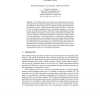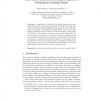115
click to vote
EWCBR
2004
Springer
15 years 5 months ago
2004
Springer
The concept of generalized cases has been proven useful when searching for configurable and flexible products, for instance, reusable components in the area of electronic design au...
EWCBR
2004
Springer
15 years 5 months ago
2004
Springer
Abstract. A CBR system needs a good case retention strategy to decide which cases to incorporate into the case base in order to maximize the performance of the system. In this work...
106
click to vote
EWCBR
2004
Springer
15 years 5 months ago
2004
Springer
Abstract. Helping software designers in their task implies the development of tools with intelligent capabilities. One such capability is the integration of natural language unders...
110
click to vote
EWCBR
2004
Springer
15 years 5 months ago
2004
Springer
Abstract. Collaborative Web Search (CWS) proposes a case-based approach to personalizing search results for the needs of a community of like-minded searchers. The search activities...
118
click to vote
EWCBR
2004
Springer
15 years 7 months ago
2004
Springer
Textual CBR systems solve problems by reusing experiences that are in textual form. Knowledge-rich comparison of textual cases remains an important challenge for these systems. How...
EWCBR
2004
Springer
15 years 7 months ago
2004
Springer
An application of relational case-based learning to the task of expressive music performance is presented. We briefly recapitulate the relational case-based learner DISTALL and em...
111
click to vote
EWCBR
2004
Springer
15 years 7 months ago
2004
Springer
Abstract. Good similarity functions are at the heart of effective case-based reasoning. However, the similarity functions that have been designed so far have been mostly linear, we...
115
click to vote
EWCBR
2004
Springer
15 years 7 months ago
2004
Springer
In industrial manufacturing rigorous testing is used to ensure that the delivered products meet their specifications. Mechanical maladjustment or faults often show their presence t...
137
click to vote
EWCBR
2004
Springer
15 years 7 months ago
2004
Springer
Case-based Reasoning (CBR) is a mature technology for building knowledge-based systems that are capable to produce useful results even if no answer matches the query exactly. Often...
133
click to vote
EWCBR
2004
Springer
15 years 7 months ago
2004
Springer
By design, Case-Based Reasoning (CBR) systems do not need deep general knowledge. In contrast to (rule-based) expert systems, CBR systems can already be used with just some initial...


